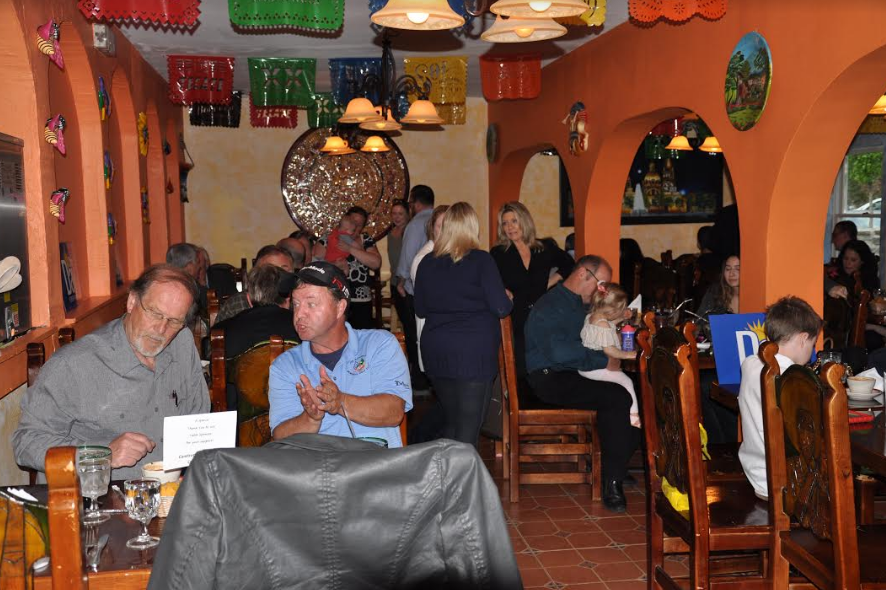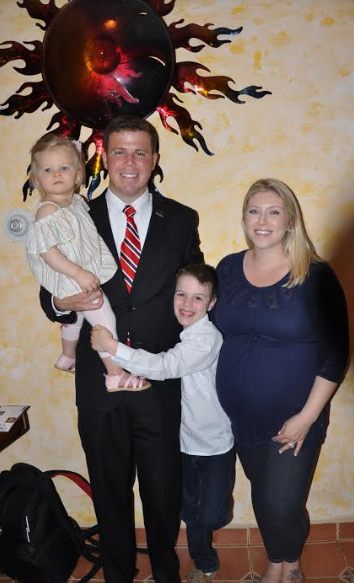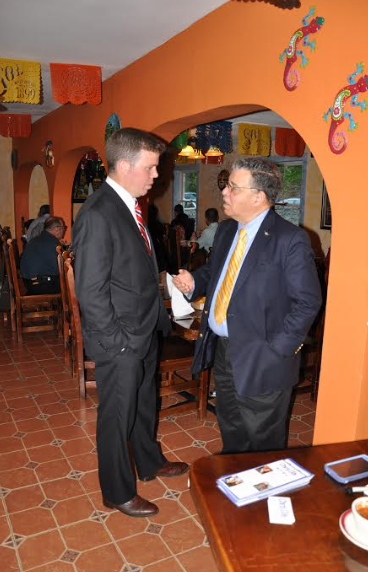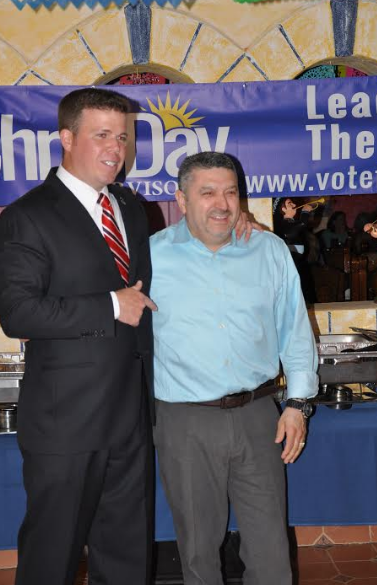BY CHRIS DAY, Republican candidate for Orangetown supervisor
PHOTOS BY SARA WALDRON (Taken at May 2 Chris Day fundraiser)
 Orangetown is known as a friendly, diverse, and welcoming place. We enjoy our suburban lifestyle and welcome all who share those characteristics and values to join us here. However, there are some who want things like high density housing, overdevelopment, and communities that exclude others, and that is something we simply cannot have. As Councilmen, Tom Diviny and Denis Troy have stood against those who want to remake Orangetown with strong, defined, and effective steps, and as Supervisor Chris Day will take the lead to implement further policies that will ensure that we can Preserve Orangetown for generations to come.
Orangetown is known as a friendly, diverse, and welcoming place. We enjoy our suburban lifestyle and welcome all who share those characteristics and values to join us here. However, there are some who want things like high density housing, overdevelopment, and communities that exclude others, and that is something we simply cannot have. As Councilmen, Tom Diviny and Denis Troy have stood against those who want to remake Orangetown with strong, defined, and effective steps, and as Supervisor Chris Day will take the lead to implement further policies that will ensure that we can Preserve Orangetown for generations to come.
 What we have Done
What we have Done
- Parks fees for nonresidents: By establishing a fee system ensures that nonresidents who use our parks contribute to their upkeep while not placing burdens on our residents, we have made sure that Orangetown’s parks can be properly enjoyed and our resources are not abused by outsiders.
- Rockland Psychiatric Center (RPC) Fields, NYCFC Training Complex & Data Center: Putting the town-owned portion of the RPC property to good use while avoiding high density housing proposals such as some that were floated in the past Kleiner administration was a priority, and as such we have, in partnership with private organizations, turned some of the property into a state of the art youth fields complex, while selling other significant portions to the NYC Football Club for a training complex and Chase for a low-impact, high value data center project.
- Landlord Registry: In order to ensure that our rules are followed, tenants are cared for, absentee landlords are held to task, and corporate or LLC ownership is not used as a mask to prevent individual accountability, the landlord registry identifies the ultimate owners of any rental properties in the town.
- Africa Inland Mission Property: When the Africa Inland Mission property came available and seemed that it might enter “fire sale” mode to buyers with no interest in adding to our community, we coordinated with the school district to organize the purchase of the property so the process could be managed more responsibly.
- No-Knock Registry: In order to prevent aggressive solicitation of home sales and “blockbusting” in our neighborhoods, the town established a registry that residents can sign onto that prevents door to door solicitors from disturbing them at home.
- Lot Size & Parking Requirements for Schools & Houses of Worship: So as to ensure proper safety in our town, this regulation effectively increased the lot size one would need in order to have such a house of worship or school in proportion to the existing zoning, as well as having substantial parking requirements.
- Public Health Engineer: The position of Town Public Health Engineer was created in order to better analyze and manage environmental (air, water, congestion, etc) impacts in all situations, to include residential developments.
- Rejected HUD Community Block Grants: By avoiding the strings that have been attached to HUD block grants that could result in losing control of local zoning and having high density, low income housing forced on the town, we rejected these funds.
 What we will Do
What we will Do
- Review and “reset” zoning rules: Zoning and codes should be both easy to follow and strictly enforced. We will conduct a full review of our town code as relates to zoning and usage and craft a new unified code that will prevent overdevelopment while greatly reducing or eliminating the need for exceptions or appeals to be granted, as once such exceptions are granted one time unscrupulous developers are able to cite that precedent to allow anything they want to be built regardless of the law. This will serve to hit “reset” on that legal precedent so there are no loopholes to exploit.
- Rezone remainder of RPC property: We will immediately rezone the remainder of the RPC property that is owned by New York State to data center/office park use in order to ensure that if the state decides to sell it off, it attracts buyers who are looking to get that type of project put in place, as opposed to buyers who intend to put high-density housing in.
- Establish fund for purchases of “under threat” property: In order to institutionalize a process to preserve our community’s major land assets, we will budget for a fund to purchase major properties that are “under threat” – which means a combination of a highly likely fire sale and unique characteristics of the property such as overall size or very specific uses. These properties will then, depending on the property, either be carefully marketed to proper buyers or repurposed for use by town residents to fulfill key services.
 Proactively search for illegal apartments using observations and utilities data: Through a combination of code enforcement officials and police officers on routine patrol, we will observe and report signs that a building is harboring illegal apartments, such as excess vehicles or a multitude of satellite dishes. Similarly, the supervisor’s office will cross reference utility records and metering with permitted usage so that if a single-family zoned home has multiple electric and water meters, code enforcement will conduct further investigation to determine if it is illegally subdivided.
Proactively search for illegal apartments using observations and utilities data: Through a combination of code enforcement officials and police officers on routine patrol, we will observe and report signs that a building is harboring illegal apartments, such as excess vehicles or a multitude of satellite dishes. Similarly, the supervisor’s office will cross reference utility records and metering with permitted usage so that if a single-family zoned home has multiple electric and water meters, code enforcement will conduct further investigation to determine if it is illegally subdivided.- Increase fines for zoning and code violations: We will change the fines system for violations of town code such that if a large company or interconnected series of LLC’s are found to be violating town code they will be fined a substantial amount on a per-unit basis, in the case of large landlord LLC’s or companies, or on a percentage of revenue basis for large corporations. This way our fines are equally forceful for large companies as they are now for an average homeowner.
- Change seasonal overnight street parking ban to year round outside of downtown areas: In order to keep congestion off our residential roads and make sure that they are not polluted by eyesores on the street, we will extend the current 2am-6am winter overnight street parking ban to year-round (excluding major holidays) outside of our downtown business districts.
- Institute goal-oriented deployment of Code Enforcement/Building Officials and hire new ones as needed:Similar to what is done in many police departments, the Supervisor will institute weekly “Code & Development Statistical Review” meeting in which the code enforcement officer and representatives from other key departments such as building will present specific data as to their activity, which will be compared to targets and past performance, with specific goals set for active patrolling by those officials to find violations of town code as opposed to passively waiting for reports from residents. As the existing staff hits full capacity based on this renewed focus, new code enforcement officials and/or building inspectors will be hired to meet the demands of Preserving Orangetown.
- Market and match real estate listings to prevent fire sales: By working with local real estate agents and monitoring key major properties and in the course of promoting the town for tourism and business, we will market residential and commercial listings in the town to responsible buyers in order to prevent sellers from having to execute fire sales to shifty cash buyers or irresponsible developers due to lack of other options.

You must be logged in to post a comment Login